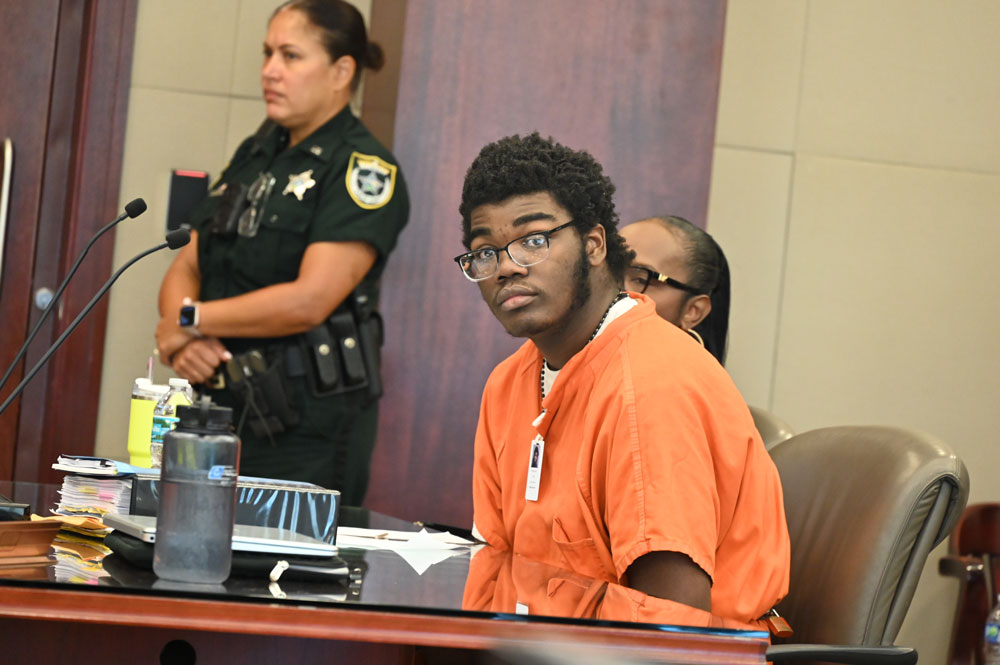
In the end no one was going to remember the two days of testimonies three months apart, the experts, the victim’s recollection of the attack, the victim’s mother’s history of raising a troubled, autistic child, now charged with a first degree felony as an adult.
Eighteen months after Brendan Depa attacked and mauled Joan Naydich, his paraprofessional at Matanzas High School, it was all about the sentence Circuit Judge Terence Perkins would impose, the sentence he imposed this afternoon with more anguish than for most sentences he has imposed in his decade and a half as a judge.
Perkins sentenced Brendan Depa to five years in prison followed by 15 years on probation.
The courtroom was full, with Depa supporters on one side, Naydich supporters, in smaller numbers, on the other, but including R.J. Larizza, the state attorney, who turns up at only the highest profile cases. All remained silent as the sentence was pronounced, as did Depa.
“Although this event was senseless, I don’t want to lose sight of the fact that at the time of this event, Mr. Depa was 17 years of age. However, this was not an isolated event,” the judge said, listing juvenile cases and violence at two group homes Depa lived in, and on a bus. “It’s an event that shows the progression of the aggression and violence that Mr. Depa was exerting on those that were around him.”
Perkins considered the problems chronic, and that autism was not the cause. He described the video as “senseless” and “extreme.”
“In this case, it was clear from this incident and some of the prior incidents that Mr. Depa’s aggression was extreme and not proportional to the triggering event,” the judge said, crediting the local jail for significantly diminishing a pattern of violence before Brandon arrived there.
Brandon’s criminal scoresheet added up to a minimum of 34.6 months in prison. He has already served 533 days, or 17.5 months. In effect, with gain time, Depa will serve 33 months in prison before probation begins.
“I don’t think he’ll survive prison,” his mother had said.
Defense Attorney Kurt Teifke’s entire strategy had been to make the case for house arrest, not prison. Assistant State Attorney Melissa Clark’s strategy was to ensure prison time. Perkins rarely goes one way or the other. He looks for the just middle, if it is legally defensible.
The defense did not minimize so much as ignore the attack, focusing instead on Brandon’s personal history and lifetime of challenges to his family, as well the support system he would have in society, if he were to return to it. As the defense attorney questioned one of its expert witnesses, Kimberly Spence, an autism-disorders specialist, Spence spoke of Depa’s regret over the attack for the first time: “He said to me, he doesn’t want to do this. He’d never ever want to do this again. He doesn’t want to hurt people. He wants to be in the community, he wants to be a productive citizen.”
As thorough as Teifke was in making the case for Brandon’s autism profile–his witnesses provided a detailed but often intractable seminar about the disorder–he had no witnesses from the school district or about the school district to shed light on what went wrong there before the attack, aside from peripheral references to Brandon’s education plan at Matanzas High School. The blind spot indemnified the school and the district and inevitably shifted more responsibility back onto Brandon than the defense argued he should bear.
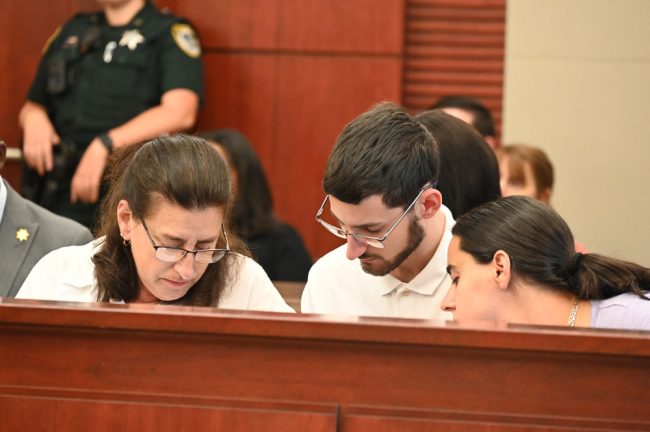
The prosecution had played the footage of the attack from three angles. It had Naydich testify at length about her challenges with Brendan before the attack and with the consequences of the beating since. Clark had the law on her side: mental illness, autism, disorders, are not excuses.
Her approach was direct: a crime is a crime, and must be punished accordingly. Brendan had shown aggressive and concerning behavior in every setting–at home, at school, at group homes, in juvenile detention, Clark said, and had even defense witnesses concede. He had been getting treatment all along, especially in the last two group homes he’d lived in, and for all that, Clark said, he still attacked Joan Naydich. (Clark did not mention that in the past year at the county jail, Brendan’s record has been much different, with just once violent incident he was responsible for.)
The mentally ill will be treated accordingly by the prison system’s health care structure, she argued, relying on the testimony of the prison system’s mental health director.
In sum, to Clark, Brendan is a dangerous individual who must pay for the attack.
The defense attempted to counter the argument when it asked Spence if she believed he was “inherently more dangerous.”
“There’s just a lot of things that I believe need to happen if all of the right things are in place,” Spence replied. “Mental health treatment, medication management, therapeutic intervention, stable living environment. That would dramatically and should dramatically reduce any concerns about behavior.”
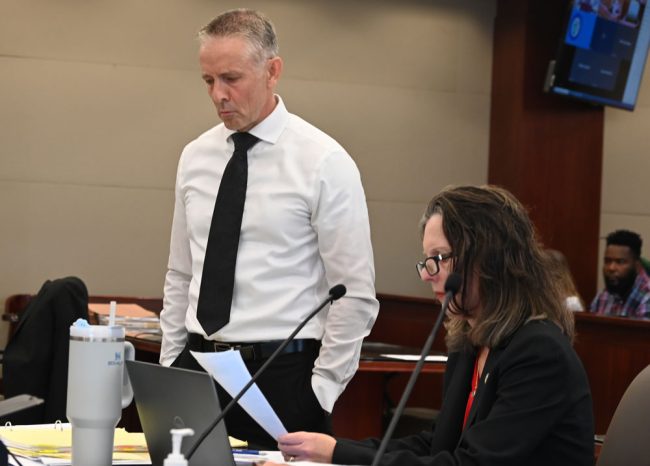
The attorneys summed up the two days’ testimonies in their closing arguments, which did not begin today until after 5 p.m., and did not add more than rhetoric to the testimony and the evidence. Clark stressed “the lack of remorse” and that “he is dangerous,” a word she used repeatedly in her 10-minute closing. “He has a high probability of violence in the future, and that’s incredibly frightening.”
She asked for prison (notably without specifying the length of the term) and a long period of probation, and repeated a common if gross misconception: “As you know, that is the primary purpose of the judicial system is punishment.” It is not, of course. The primary purpose of the judicial system is justice, which may and often does mean punishment.
Teifke pushed for two years in a juvenile justice system’s home, which clearly gave the judge heartburn: Perkins did not see how that would benefit even Brandon if he were released from that measure in two years. But the heart of his argument was a question Teifke posed as if he were the judge: “Is that in fact true that the public interest require that I impose an adult sentence?”
Perkins was on such a different page that he even proposed the more logical argument to Teifke: why not take advantage of the court’s authority to impose a sentence with a window of up to 30 years, even a probationary sentence, which could then enable supervision until Brendan was ready to terminate out of it? The judge had opened the door to a strictly probationary sentence. He had not even mentioned prison. It was an arresting opening for the defense.
Teifke didn’t take it. He either didn’t understand what the judge had done or thought it somehow too harsh. He was focused on his own argument. He still believed the juvenile sanction approach was best. If he went with the judge’s proposal, he told Perkins, “I wouldn’t be doing my job.”
Clark in her second closing understood exactly what the judge had proposed, saw Teifke lose his chance, and pounced: “I think everybody is losing sight of what happened here,” she said, meaning the beating that changed Naydich’s life. Then she specified: seven years in prison, followed by at least 10 years on probation. “Everybody wants to see Mr. Depa succeed, but first we need to deal with what he did,” Clark said.
It was difficult to imagine how the judge would close the case without a prison sentence, however brief, however discordant with Brandon’s history when divorced from the public frenzy the video of the attack against Naydich generated–a video without which the case would have not likely generated either the attention or the consequences it has.
On May 1, in what Perkins described as Phase 1 of the hearing, the most dramatic testimony had been that of Naydich. Today, it was that of Brendan’s mother, Leann Depa.
Her time on the stand was a biography of Brendan spoken in an often broken voice recalling the history of a fragile character. He was 5 months old when the Depa family got him as a foster child, with the intention to adopt him, as the family had adopted a previous child. He’d come from a violent home.
As he grew up, “his emotions were always really big,” Leann Depa said. “If something was funny, he was hysterical. Just big belly laughs, and if something was upsetting, he could just sob and sob and sob. He could easily get overwhelmed and have a meltdown.” Child care and public schooling did not agree with him. He had a lot of fears. “The sound of flies would drive him insane.” He was afraid of stickers on bananas, of rubber bands. Noise upset him. Commotion upset him. His temperament was unpredictable. “It could go from zero to 100 in a second.” He would be fine, then he would suddenly react.
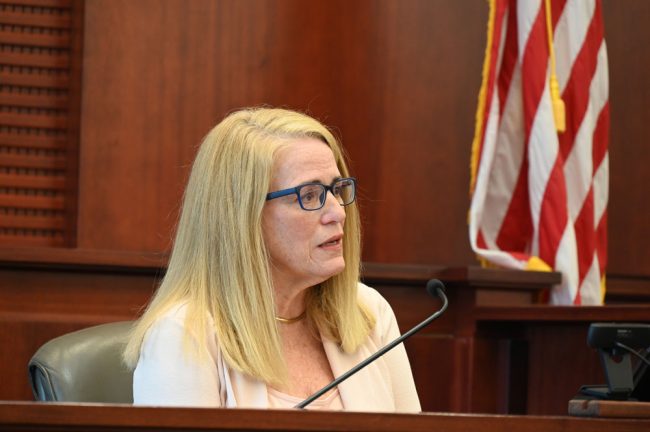
Homeschooling went better, but sensory issues remained. “Everything black and white,” his mother said. She pulled her other children from school and homeschooled.
He’d take ADHD medication but the side effects were horrible: he’d imagine swarms of flies around him. No single medication seemed to work. In 2017 the family had a “major crisis,” Leann Depa testified, when her mother, who was very close to Brandon, was dying of pancreatic cancer. At the same time, Leann’s daughter had a mass removed from her brain, and became more impulsive after her surgery. That’s when Leann put him on the sort of psychotic medication she had previously resisted, because of his young age. It did not go well.
He was on 17 different cocktails of medications because of all the professionals involved,” and through that period, Baker Acts–the involuntary commitment to a psychiatric facility to prevent self-harm, or harm to others–accumulated. He was also gaining 10 pounds a month after being a normal-size child.
“It was a constant in and out that year with all the doctors doing the opposite of each other and adding on to each other,” Leann said, referring to the medication cocktails. Disorder diagnoses accumulated, too–opposition, defiance, aggression, each with its own technical term. “I was trying to manage the best I can and I was failing,” his mother said.
She took master classes in autism, studied various theories, took training in emotional regulation.
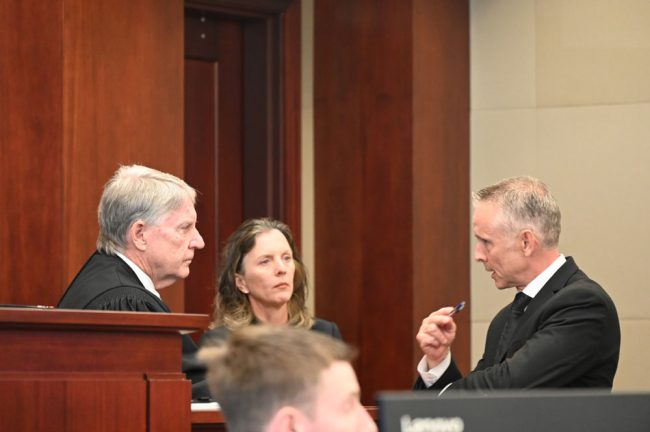
The first baker Act was in 2018, a lot of it the result of aggression with his sister. Health care professionals had advised her to call 911 whenever there was trouble. “I was more afraid for Brendan and his sister together, how they were going at each other, and I couldn’t see a way out of treating him in the home at that time with the medication,” Leann said, even as homeschooling was working. She placed him in a residential home in South Carolina. Then Covid hit. “Everything got shut down to where we couldn’t go see him,” she said. “Covid was such a factor in all of this.” Add to all this Leann’s husband’s massive heart attack.
She then placed him in the “Level 6” ECHO group home in Palm Coast in November 2020, Level 6 meaning that he needed the most support. That lasted until his arrest in February 2023. She and her husband would alternate visits every two weeks, staying in hotels with him or taking extended time at Airbnb’s. He was doing OK.
ECHO forced all its clients to go to public school, making it a requirement if someone was a resident there and assuring families that it had a support team to ensure success. It took the Flagler school district four months to place him. From there on, it was the wrangles over the IEP, the Individualized Education Plan prepared for all students with special needs through an elaborate and continuing process involving a sizable committee that includes school personnel and family members. Depa warned Matanzas of her son’s triggers, electronics among them.
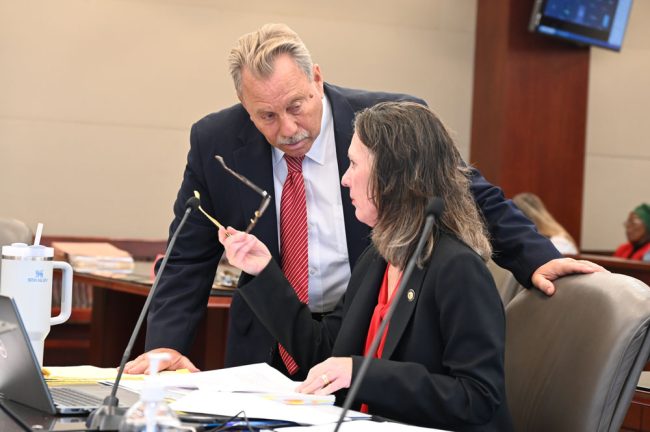
She read from the IEP: what to do with Brendan, how to do it, what to avoid, among the 25 directives listed in the plan.
But the prosecution objected every time Depa’s lawyer asked his mother to assess his emotional maturity or other psychological observations. Since he’s been in jail, she has found a group home 20 minutes from her house that can take him now–in the Tampa area, with a full awareness of Brendan’s needs: the home met and screened him online. She’s also lined up several transitional homes, in case he is imprisoned and released.
She’s also prepared to take him home in case he is given a community-based sentence (such as house arrest). She’s been talking to him every day at the Flagler County jail. She described a broad support system prepared to work with Brendan, whether it’s a former school resource officer or other parents of autistic children or Gene Lopes, the retired educator and his tutor for the past year at the jail. “Brendan is always going to be with one of us. He’s not going to be out in public on his own. He will be with one of us,” his mother said. She addressed the judge directly: “I beg you, to let him come home with me. I want my son back.”
The prosecutor’s questions focused on the challenges of caring for Brendan at home.
Clark when she cross-examined Leann Depa almost immediately elicited the history of Brendan’s “problems with aggression,” at home, at the residential home in South Carolina, at Echo, punching staff, punching a psychiatrist several times, head-butting staff, throwing chairs, groping female staff inappropriately, attacking fellow-residents, ripping a door off. “Fair to say that his aggressive behavior was continuing well into his stay at ECHO,” Clark asked Depa, more as a statement than a question.
Clark repeated the same questions to both the defense’s expert witnesses, bringing out more alarming behavior, “including being cruel or purposefully harming an animal,” that he often lied to get things he wanted, stole, “annoyed people on purpose,” and so on.
Depa’s mother refuted the claim that he’d harmed an animal. The most he’d ever done was hiss at a cat. “Brendan has never, ever harmed an animal,” she said when she was recalled to the stand in the afternoon. The testimony undermined the credibility of some of the prosecution’s other claims, especially since some were based on Brandon’s reporting, not on independent documentation.
Clark followed a line of questions about the homes Leann Depa has lined up for her son, skeptically asking why she would seek out facilities primarily focused on drug recovery, if Brendan has no issues with drugs and alcohol, in facilities that are not secure: no gates, no way to prevent a resident from leaving.
Clark questioned her about her reluctance to medicate Brendan, though Leann stressed that it was only to limit the side effects, and about the family’s decision to send Brendan to residential and group homes for “several years.” Clark was preparing to argue that Brendan was difficult to manage, even now, with the group home his mother found for him in Tampa. But it was a mostly muted cross-examination.
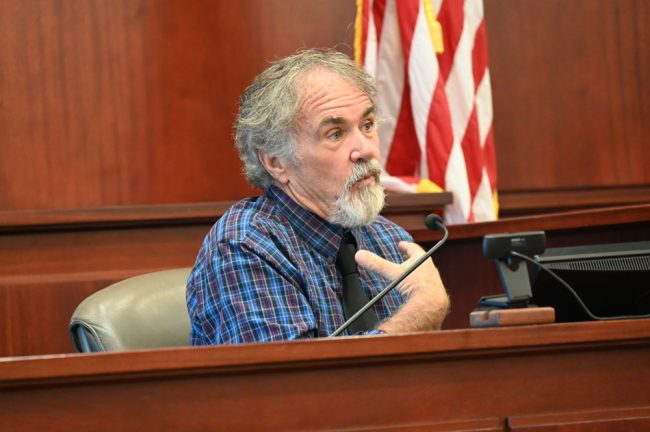
The defense then questioned Eugene Lopes, the retired special education teacher who since last November has spent some 200 hours tutoring Brendan at the county jail, over 80 to 100 days, all as a volunteer. Lopes could combine his experience with special education (including its procedural intricacies) with his familiarity with Brendan. Lopes spoke of paraprofessionals as little short of heroic. He could also speak of the critical importance of following IEPs to the letter (which was not done in Depa’s case), of personal connections with students, and of being attacked.
“I’ve been spit on, I’ve been kicked, I’ve been punched, I’ve been called fat a couple of times, and I’ve thinned out, I’ve been bit,” Lopes said. The experiences informed his approach. “But don’t escalate. That is a thing you want to avoid at all costs. Don’t escalate.”
The prosecutor had no questions for Lopes.
The defense also questioned Kimberly Spence, the autism-disorders specialist, and Julie Harper, a psychologist, both expert witnesses–the hired-gun equivalent to Gregory Pritchard, a psychologist and expert for the prosecution. (The prosecution disingenuously asked the defense’s expert witnesses to say how much they were paid to appear, when its own expert was paid in the same range.)
In May, Pritchard had downplayed the severity of Brendan’s autism. Without referring to them, Spence shrugged off Pritchard’s conclusions to make the case for extensive services. “I disagree that he’s a Level 1,” she said in reference to the three levels of needs for people on the autism spectrum. She (like Harper) rated him as Level 2. He would require “substantial services.”
“I do not believe you will receive the treatment he needs” in prison, Spence said, “and the things that are happening in Brendan’s behavior, incarcerating him is not going to change the factors that precipitate that behavior.” Incarceration would not rehabilitate him, she said.
In a dueling rebuttal, the prosecutor returned Pritchard to the stand, via zoom–he’d followed all the proceedings–to reject the defense’s argument that Brandon’s punishment should be limited to a residential home for two years. Calling it “misguided,” he said previous residential homes showed “minimal or nonexistent” gains, if improving his behavior was the goal. As he had on May 1, repeatedly, Pritchard wasted no time before he mentioned Depa’s “large size.”
“He’s going to need support and supervision for a lot of things, and a lot of things have been mentioned.,” Pritchard said. “So yes, this going to be carried out for a long time for Mr. Depa, there shouldn’t be any expectation that he’s suddenly going to not need any of this intervention.” But in prison. Not elsewhere.
“Just so I’m understanding this correctly,” Teifke asked Pritchard, “if there’s been prior problems when he interfaces with other juveniles, you believe that no such problem would exist if we place him in a general prison population with adult criminal balance?”
“No, I think Mr. Depa was going to have problems no matter what environment he is in, in going forward for at least a fairly significant amount of time, judging from his history,” Prictahrd said. But he was, in fact, saying that Depa was better off in a state prison with adults: “What I am suggesting is that peers, especially peers with problems, they would ostensibly be more difficult to get along with, maybe more apt to pick on Mr. Depa, push his buttons, more immature things of that nature relative to people who are maybe more mature adult population.”

Teifke could barely control his disgust, and returned to the defendant’s table with an inaudible, dismissive statement.
Spence earlier provided as lucid a definition and explanation of autism as had been heard in the two days of testimony until then: “If you’re a person that doesn’t have autism, your factory setting as I like to say is you are pre-programmed to look at people in the face. You are pre programmed to look to seek out information from people’s body language, from the tone of their voice. When you have autism, your brain is not wired in that same way. So you’re often missing that information. You’re missing nonverbal social cues. You’re missing subtleties that exist in communications between people. And when you miss that you often miss a lot of the meaning that happens in a communication.”
Elegant summations aside, the expert testimonies were more technical than those of Depa’s mother and Lopes, and were intended purely as tactical rebuttal of the state’s case that Depa’s mental health challenges are not particularly unusual and that they would be monitored and treated appropriately in prison. But Spence also left little doubt that Depa’s IEP was not followed. She said it was “shocking” the extent to which the IEP’s directives on electronics was ignored.
It had been an instance of disciplining Brandon, using his game, that triggered the attack on Naydich. Spence returned to those flawed responses to Depa by school staff three or four times.
Harper had also worked with the Department of Juvenile Justice as a competency assessor and to determine the level of service needs juveniles needed. Her testimony was about the significantly different ways juveniles make decisions and behave–a testimony apparently intended to sway the judge toward sentencing Brendan as a juvenile offender rather than as an adult.
The last witness, Woody Douge, a senior probation officer at the Department of Juvenile Justice, was the last witness of the day, stepping into the box at 4 p.m. He was the probation officer assigned to Depa. After Brandon pleaded, he was responsible for making a sentencing recommendation to the court. That recommendation was for commitment to a residential program that would work much like a diversionary option. He listed several. He could be there until he’s 21, but would then be released outright.
If he is not successful in that program, Brandon can be returned to the court system. But that recommendation was made without awareness of Brandon’s violent outbursts at the residential homes in South Carolina and in Palm Coast.
![]()





























David S. says
At least he got 5years and 10 probation , I hope that he will get the help that he needs.
The dude says
This sentence all but guarantees he won’t.
Endless dark money says
Help in prison haha that’s funny. 15 years probation will ensure he stays locked up for his life especially for someone with know issues. Crazy, the gop leader has more felonies than this kid and he still a free man.
WKH says
I put most of this on the mother. Too many times a parent will use our public school system as a daycare because they can’t handle their children. Disgusting. My mother is a retired special needs teacher and has been beat up, bitten, had her hand broken, etc. Parents need to be held accountable for their child’s actions. If you want him to be sentenced as a juvenile then who’s to blame? Duh. I hope the kid gets the help he needs and can be a productive member of society at some point in time but actions have consequences.
READ IT ALL says
Did you even read the article? He was homeschooled until he was in a residential facility that required him to attend public school as a part of their program. The article went as far as saying the program FORCED clients to attend as a requirement. It also mentions how the mother warned of his triggers clearly indicating her mindset that his attending public school was not a good idea. How dare you blame the parents who have tried so hard to provide everything in their power for him while addressing his mental illness.
Pat V says
Yeah one of his triggers is telling him “no”. He will continue to be a drain on the system because it doesn’t seem like he will ever be a productive member of society. Just because someone is disabled or has mental issues doesn’t mean they get to harm others with no consequences. He has a history of bullying and attacking others.
William Stonehocker says
The mom knew her son had problems. It was when he was in the state’s custody that issues arose. Also, the mom never once told Brendan to go attack his own teacher’s aide.
Pat V says
His mother couldn’t handle him and had to use the Baker Act to protect herself, husband and his sister from him…i
Keep Flagler Beautiful says
His mother doesn’t think he’ll survive prison? I would say the other prisoners had better watch their backs. He is an extremely dangerous individual who cannot control himself.
JUSTICE ? says
Perkins you dont have many reasons as a judge to put an individual who has autism in prison. Flagler County School District dropped the ball on so many different levels. They will no doubt be held liable for failing to have the correct staff, and setting him off for taking away the things that triggers his violent behaavior.
I have a BA in Developmental Psychology. I have been on Child Study Teams, written IEPS, and workrd as Educator,
and I havea been a one on one with adolescents as well as teens who can become violent. Nobody who was not certified, or given the proper’ training was not allowed to interact with that student.
5 years ? ? ?
WHAT IS YOUR DAMAGE ?? ?
This individual will never, ever get the proper medicaton, if he gets any at all.
I work at a County Jail as a civilian. The “mental healthcare” is a joke.
Why dont you put the real criminals in jail instead of those who truly need psychatric help.
I hate to say this, but you should have might as well signed his execution papers.
What would you do if that was your son, grandson Perkins ? Sentence him to 5 years in prison when you know for a fact that your loved one isnt going to get proper medicatioon, setting him up to a longer sentence for any incidents.
Justice Perkins ? You are a sorry ass excuse for a judge
joe schemo says
thats not even what happened
Skibum says
Unfortunately, all I heard in your comments was passing the blame onto someone else, in your case, the judge… now it is all his fault. In my mind, the very serious assault that Depa committed inside the school against the paraprofessional was no different than those with mental health problems who assault and injured or killed law enforcement officers who were merely doing their jobs and were unknowingly confronted by an individual intent on doing them harm. Police officers should be able to finish up their work days and go home to their families in one piece. It is no different for school employees. The victim in this case started her work day at Matanzas High School, and she was merely doing her job that was assigned to her, and did not deserve to be beaten within an inch of her life, so I wonder where your stated outrage over what happened to her is, or at least show some compassion for the innocent woman who was so seriously injured by Depa. It is not the judge’s fault. His job at sentencing was to dispense justice in a court of law for the innocent victim of this crime in which Depa had previously pleaded no contest to. If you listen to what Depa’s mother said in her plea to the judge, she admitted that her son had many instances of violence in the past and had a short trigger. She told the judge that she had tried nearly everything but wasn’t able to control him, and I assume that is why he was no longer living in her home when the assault incident occurred. He should have NEVER been allowed to be in such an environment in that school in the first place, and I believe that there is enough blame to go around for why he was put there, but the bottom line is that HE is responsible for his own behavior, for the unprovoked assault on that innocent woman, and I think it is ridiculous that you somehow think the judge should have done anything other than given Depa the prison sentence that was given to him for committing the crime that he is guilty of committing. There are no winners in a sad situation like this, but I believe justice was properly dispensed.
William Stonehocker says
While I give Naydich love for surviving, she was not supposed to be an aide. Think about it, she didn’t have the credentials to become one.
Also, shame on ECHO for shipping him off to a public school knowing he was not supposed to be at one. Turns out, not one ECHO employee ever got to tell their side of the story in court.
I also wanted to ask, where the hell was LeAnne’s husband during this whole court trial? Why didn’t he get a chance to tell his side of the story? The teacher known as Barbara Buchanan…did she want no part of the trial?
William Stonehocker says
Five years eh? Couldn’t he be spending that in a mental hospital? At least they are giving him probation. Hell, his white peer John Wilford was on probation because his attack wasn’t on camera.
Here’s the thing, I have autism and my parents know that autistic people in prison are more likely to get exploited.
Reba Johnson…she was found unfit to stand trial and is living a private life because her attack didn’t end up on camera. She and Abigail from FatheringAutism on Youtube are hotties, even though Abigail is non-verbal.
Steve says
Well there’s some Justice for the victim but not long enough IMO. Probably not the last we hear about Depa.
JUSTICE says
No doubt this isnt the time you hear about him. I’m sure you will read his name in some byline or backpage news story,
Something about how he was attacked in prison,or how he became violent against other prisoners or guards because he is not on the proper or no medication at all. Then he be put in isolation for at least a month.
Alcoholics and drug addicts get more help and empathy than the mentally challenged, even though most of society recognizes that alcohol or drug addiction is a disease. The people who are mentally challenged, do not recieve the same treatment. Mental illness is misunderstood.
The Sour Kraut says
“Brendan’s record has been much different, with just once violent incident he was responsible for.”
If that one incident is against someone you love, how would you feel? Does his mental health negate the injuries sustained?
Duncan says
Seems like a very harsh sentence, for a juvenal, that was essentially provoked into his aggressive behavior, albeit unknowingly, by Ms. Naydich.
I hope the school system is reassessing their policies. It’s their failure was responsible for this travesty!
Assigning a rookie paraprofessional, to a complex behavioral case, without even having a formal IEP review with the paraprofessional.
That is the criminal behavior!
joe schemo says
thats not what happened, she took nothing from him
Melissa says
Yes, seems like the situation could have been avoided entirely if the school had done a better job at making sure the IEP was followed, and offering better training to new paraprofessionals. They really dropped the ball, and it’s tragic that the school’s inaction and ignorance forever changed the lives of two people when it was completely avoidable.
I hope that Brendan Depa gets the help he needs while he’s in prison and out on probation, and is able to move past this. I also hope Ms. Naydich is able to heal from the mental and physical trauma she’s experienced. I hope the school district learned something from this to avoid any future violence like this from occurring. Sad situation all around.
Tired of it says
What a miscarriage of justice. I hope the mother sues the school sysrem that failed to follow the guidelines. I can’t help but think that if he was white this would never have gotten so far.
Ric Flair says
I wonder if Depa still has a lawsuit pending against Flagler County. I would strongly advise Mrs Naydich to file a civil suit against Depa immediately. If Flagler County were to offer Depa some kind of settlement then that money would go to Mrs Naydich if she had a judgement in place.
R.S. says
The get-even mentality was all over the state attorney. “A crime is a crime, and must be punished accordingly” is such a misguided idea. If there is no improvement, punishment is pointless. And our prison system clearly is underfunded and improperly staffed. The statistics tell it clearly: 70 percent is the recidivism rate in the US; i.e. people in jail at best worsen. In Scandinavian countries, the recidivism rate is at 20 percent; they fund the prisons and make them learning institutions. Single-minded educational theory “hit him and if the do wrong hit them harder until you finally have to kill ’em” is absolutely stupid. Gotta remember the names associated with this stultification of justice in case they crop up at an opportunity at the voting booth.
Deborah Coffey says
The basic, bottom line question: What KIND of country do we want to be?
Land of no turn signals says says
Welcome to 2024 where he’s victim.
The Sour Kraut says
BTW, is this the thirtyfith or thirtysixth story about Depa? I have lost track.
Pat V says
history of Brendan’s “problems with aggression,” at home, at the residential home in South Carolina, at Echo, punching staff, punching a psychiatrist several times, head-butting staff, throwing chairs, groping female staff inappropriately, attacking fellow-residents, ripping a door off. “Fair to say that his aggressive behavior was continuing well into his stay at ECHO,” his adoptive father didn’t even testify. Not a shred of remorse or even attempt at taking responsibility. His adoptive mother couldn’t even protect her own daughter from him. I guarantee he will violate parole I just hope no one’s seriously injured by him again.
William Stonehocker says
Wait, what the hell did his adoptive father do and where was he this whole time?
Jbegler says
I believe justice was served. Also to JUSTICE, he will not be going to county jail, he will be going to prison. Mental health care is a priority in prison.
Jim says
So glad , hope he rots there, gets in more trouble, and sentencing is tripled
William Stonehocker says
You don’t know that. Gene Lopes was one person who kept Brendan sane.
Kathy says
My heart is with this devastated family. Their son, with severe autism and co-occurring mental illness, should not be in prison. He should be in a specialized residential setting that can provide him all the intensive medical, mental health and allied health support he needs to be stable, healthy and happy. Does such a setting exist? For the most part, no, not in this country. Our policy/research direction has been one of pretending that all persons with disabilities, regardless of the nature and severity of the disability, can live successfully “in the community” without intensive, appropriate supports and services. When a disabled person doesn’t live up to that expectation, what do we do? We put them in prison, in a homeless shelter, on the street, perhaps on the back wards of a state psych hospital or a nursing home. We avoid, we punish, out of ignorance and fear. We live in a country with some of the best educational and research facilities in the world. And this is the best we can do? We need a national moon shot research initiative on behalf of our fellow citizens with severe cognitive and behavioral disabilities, including those with severe/profound autism, one that will lead to safe and successful treatments, therapies, educational/vocational/day programs, residential settings. If we continue to fail this vulnerable population, we might as well warn up and coming generations to consider carefully whether to have children. There are no guarantees, and your society may not have your back.